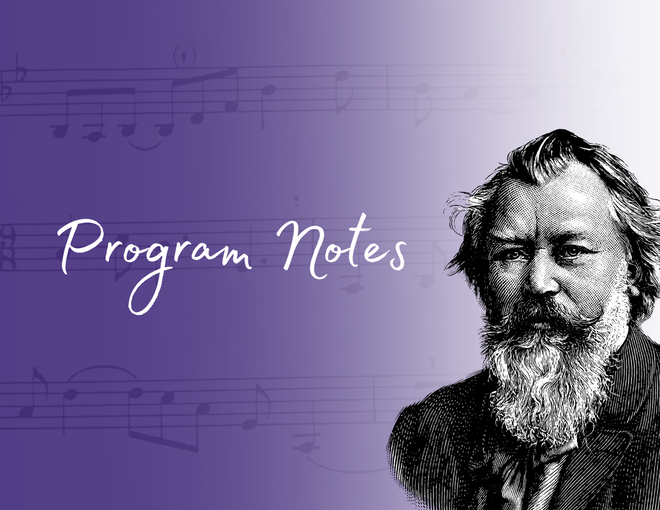|
This November, the Asheville Symphony Chorus opens the 2023-2024 season with a program of folk and love songs from Germany, Slovakia, and Hungary (see our full line-up here). From Germany, ASC Director and Conductor Kyle Ritter has selected passages from Johannes Brahms' Liebeslieder Waltzes Op. 52 . Ahead of the concert, Ritter sat down to talk through the Walzer, why he chose Brahms for the program, and what the audience should listen for in the setting of this Romantic text.
About the Composer Born in Hamburg in 1833, German composer Johannes Brahms is noted for his work on a variety of orchestral compositions, including his Second Symphony Op. 73, the Violin Concerto Op. 77 and the Academic Festival Overture. However, he may be most well known for later works like his Third and Fourth Symphonies, the former of which fellow German composer Richard Strauss called "a giant work, great in concept and invention." Aside from his compositional accomplishments, Brahms was also a key influence on the lives and works of contemporary composers, including fellow German Strauss, the Austro-Bohemian composer Gustav Mahler, and Czech composer Antonín Dvořák. Brahms was so influential on Dvořák that he recommended the younger composer to his publisher, and Dvořák later dedicated his 1878 work String Quartet, Op. 34 to Brahms, likely as an expression of gratitude for all Brahms had done to elevate the Czech composer's fledgling career. During much of his career, Brahms was an adherent to and proponent of the concept of absolute music, or music that's not "about" anything. Consider it "music for music's sake." Why the Liebeslieder Waltzer? When ASC Director Kyle Ritter was planning the first concert of the 2023-2024 season, he sought advice from a good friend. "They're a really fabulous organist and choral director," he says. "They brought up the waltzes. I'd previously performed them and played them, as well. And I thought, what a truly fabulous idea." Unlike many choral works, Brahms' Liebeslieder Waltzes were originally intended to be performed by small ensembles in the salons of Europe's gentry. "They weren't even necessarily meant to be performed as a set," Ritter says. ASC will be performing 10 of the 18 works in the opus. "They're just exquisite works," says Ritter. "Every one's individually a gem and they kind of stand on their own." Like all waltzes, Brahms' Liebeslieder compositions are designed for dance in 3/4 time. They're written in the Ländler style, a type of folk dance that reached the height of its popularity at the end of the 18th century, largely in Austria, Bavaria, German Switzerland, and Slovenia. Despite the fact that the Liebeslieder pieces were written nearly 70 years after the height of the popularity of the Ländler style, they were immediately well received by concertgoers. While early critics lamented the lack of melodic flow within the Liebeslieder Waltzes, perception rapidly changed following a landmark 1870 performance of the pieces in London. "I came to Brahms late, as far as my admiration of his music," says Ritter. "I never was a real Romanticist. I appreciated Baroque music and I really appreciated 20th-century music, and the Romantic stuff to seemed dark to me. It took me a while to sort of 'grow up' and look at the intricacy of Brahms, and how intentional and genius all of it is." Text Wedded to Tune The Liebeslieder Waltzes' Romantic text comes from German poet and philosopher Georg Friedrich Daumer's Polydora, a collection of folk songs and love poems that likely would have resonated with elites and the populace alike, contributing to the pieces' universal popularity at the time — and its continued appeal. "I really hope that [the audience] has the program open to the translation [while ASC performs], because I really do think Brahms masterfully sets those texts," says Ritter. "I want the audience to imagine themselves seated in a salon, immersed in in the experience of hearing the poetry, hearing how Brahms paints the nuances and the feelings of those texts." When and Where Can You See the Liebeslieder Waltzes Performed? The Asheville Symphony Chorus will perform selections from the Liebeslieder Waltzes, among other folk settings, at First Baptist Church of Asheville on November 12, 2023 at 7pm. Tickets are available on ASC's Concerts page. Comments are closed.
|
AddressPO Box 1387
Asheville, NC 28802 |
President's Phone(828) 231-3960
|
|
(c) 2023 Asheville Symphony Chorus PRIVACY POLICY

